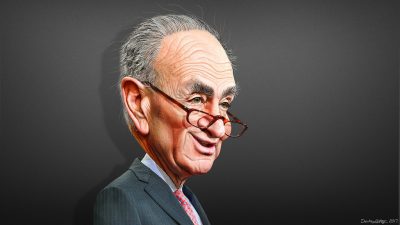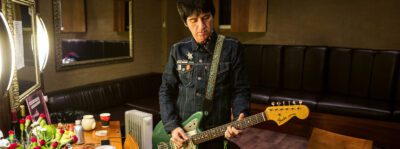The Golden Door: In Trump’s America, Echoes of Mao’s China
My parents arrived in America in the 1980s. They emigrated from China—godless, chaotic, Communist China—a place that was reeling from decades of turmoil, struggling to orient itself after the death of a leader who loomed larger than God. They’d least expect to encounter characteristics of that China in their new home, in one of the world’s most developed countries, nearly three decades later.
Both my mother and my father came of age in Shanghai during Mao’s Cultural Revolution, a ten-year period of purging and purifying. Tradition had to be purged, according to Mao, as did scholarship. So-called intellectuals were stoned and humiliated in the streets (among them, my parents and their families); antiques and heirlooms were destroyed in people’s homes by mobs of young Red Guards. (My maternal great-grandfather had the ingenious idea of decorating our family’s porcelain vases with red paper emblazoned with Mao’s slogans. No Red Guard would dare desecrate the words of the exalted Chairman.)
Non-Maoist ideology had to be purged most of all, and so my parents—considered privileged by virtue of their urban upbringing—were sent to rural labor camps to be cleansed of their views and their education. As always, Mao chose a poetic, euphemistic name for the movement: “Up to the Mountains, Down to the Countryside.” High schools were abruptly closed. My mother was sent to the fetid, leech-filled rice paddies just outside of Shanghai. My father was sent to the Great Northern Wilderness, China’s frigid, remote northeastern extremity.
The Cultural Revolution ended with Mao’s death in 1976, but not before it robbed millions of their adolescence, and millions more of their lives. When the Gaokao—China’s annual exam for college entrance—was reinstated in 1977, my parents were amid the scramble to test into the nation’s universities, both having spent their nights covertly studying in the hopes that schools would someday reopen. “Political checks” and red tape would delay their entrance, but eventually, both of them made it through.
They met stateside nearly a decade later, as grad students. On their wedding day in 1989, my mother carried a bouquet of colorful plastic lilies down the aisle of a professor’s church in Logan, Utah. I was born two years later.
Like many first-generation Asian Americans, I was fortunate enough to experience a gradual upward mobility growing up. Our one-bedroom apartment became a split-level home, then a large two-story house. Friday night dinners—our weekly indulgence of dining out—progressed from Chuck-A-Rama, the local $10 pioneer-themed buffet, to the more luxe Romano’s Macaroni Grill. In elementary school, I was ridiculed for wearing “gross old hand-me-downs” (actual words used by a classmate!), but by the time I entered high school, my closet overflowed with new clothing from the local mall.
My parents attribute their modest success to their industriousness. They fit the stereotype of the model minority: quiet, hard-working, never rabble-rousing.
And so it was all the more startling when, on a late night in my Brooklyn apartment in June 2016, my mother revealed to me over the phone that she had my father had been detained while attending their favorite air show. “One more thing,” she had added casually, in her calm and melodious cadence of Mandarin. “Your father and I were …questioned… at Hill Air Force Base earlier today.”
“WHAT?!”
They’d been at the Utah Air Show, an annual display of aviatic skill taking place on Hill Air Force Base near Ogden, Utah. To my father, a one-time engineer and military history enthusiast, the showcase was as spectacular as it had been during his first visit in 1997. He’d admired the fighter jets, the cargo planes, the sophisticated engineering—all set against the dramatic backdrop of the Wasatch Mountain Range. And he eagerly asked questions to the staffers manning the event.
Things were different during this particular visit: My father’s curiosity eventually roused suspicion. He was wrapping up a conversation with an F-35 pilot when two plainclothes security officers approached, flashing their badges so quickly that my parents didn’t understand who they were or what agency they represented.
The men photographed my parents’ driver’s licenses and ordered my dad to show them every photograph he had taken on his DSLR. They asked invasive questions about my parents’ occupations, former employers, families, and me, their only child. They demanded to know why my dad had asked so many questions; interest alone wasn’t a satisfactory answer. They were especially interested in my parents’ relationship with China. Before letting them go, they questioned my parents’ immigration status. (Both of my parents are naturalized U.S. citizens.)
I learned most of this information in the days following that initial phone call with my mom. My dad — typically closed off and emotionally reserved — sent me an uncharacteristically candid e-mail. “My life in China was in constant fear as China was very much a police country at that time. To seek freedom was one of the reasons why I came to the U.S. and became a citizen,” he wrote. “Yesterday’s incidence was like a nightmare and made me feel again like in a police country.” He feared that the photographing of his ID meant that my parents had been added to some sort of sinister list.
My parents and I hoped that their encounter had been an isolated incident, but I’d think of my father’s email again and again in following months, throughout a series of global events that indicated an irrefutable rise of xenophobia and conservatism in the West. And I’d remember it most of all in November, when Donald Trump was elected President of the United States.
Trump and Mao are curiously analogous in many ways. The two are both political outsiders who rose to power by appealing to a disgruntled hoi polloi—and by pontificating the wish to turn long-standing institutions upside down. They share a staggering capacity for narcissism and myth-making, and a talent for spreading grandiose, simplistic sayings—Mao through his Little Red Book (a work of biblical proportions), and Trump, through his Twitter.
Perhaps most troubling of all, they both possess a “knack for polemical excess and xenophobia” and a worldview that entails “banishing diversity, difference, or considerations of civil liberty,” as the New Yorker’s Jiayang Fan wrote last May. Without oversight, Mao was able to manifest his dogma into a series of campaigns that would pit China’s citizens against one another in order to survive: the Great Leap Forward and the resulting famine; the Anti-Rightist Movement and its executions of prominent intellectuals and judiciaries; the Cultural Revolution and its mass hysteria and suicide.
My parents’ unexpected confrontation at the Utah Air Show was both a searing reminder of past suffering and a bitter realization that the same vein of violence can manifest itself under the right circumstances anywhere. They weren’t alone, either. When an Asian American New York Times editor penned an open letter describing a racist encounter he’d experienced in October, hundreds came forward to share their own brushes with racially-motivated violence. Since the election, the uptick in violence against Asian Americans has been so severe as to prompt a civil rights nonprofit establishing a website that tracks anti-Asian hate crimes. The surge has been consistent with a wave of hate crimes targeting all minorities.
In NYC alone, there are over half a million Chinese Americans, the majority foreign-born. Many of them would have lived through the Mao years, the trauma of which is certainly not forgotten. For them, each encounter with xenophobia not only reaffirms the overpowering sense of otherness that all immigrants feel, but also the wounds of former hardships.
The opening salvo of the Trump administration—the Muslim ban, the war on the media, the doubling-down on nationalism — contains familiar echoes of all oppressive regimes. For my parents, the xenophobic experience on the Air Force base wasn’t isolated incident. Under the current administration, it never will be. It’s immigrants and minorities who feel that the most, every day.
You might also like 



















